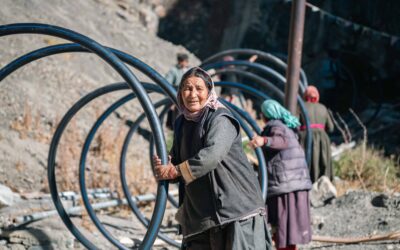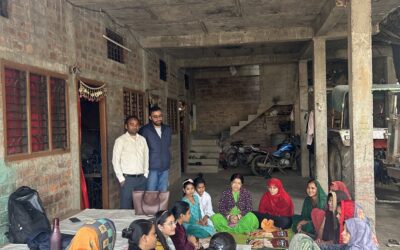The heat of the day vanished as evening kicked in. The air became cooler. The sun hid behind dense trees that stood tall on the banks of the stream. A Bulbul sat on the electric cable that ran above, and hopped along the wire from time to time. A spider made a web between two branches and hung upside down in the middle. Dragon flies wandered aimlessly with no intention to settle. Rarely, a butterfly would come to sit on a stone. The stream moved gently down into the valley and except for the leaves that fell, creating ripples, there was no other movement. As the heat vanished, the sun was in a hurry to retire; greeting the glimmering moon as it went by. It was a time when sultry monsoon transformed into chilly winters.
No one visited Degaon after evening, or for that matter, even during the day. No one visited Degaon ever, except for its inhabitants. As night fell, the village shut and packed itself into the forest and is reborn in the morning, the day after.
Degaon was far across the stream, on a forest hill of the Sahyadri. It was not really a village, though there were a few hundred people living shabbily here and there alongside goats, dogs, cats, hens, squirrels, garden lizards, chameleons and harmless water snakes. The men of Degaon were bare bodied with stretched temples and chiseled jawlines. The women were skinny and chewed betel nut all day. Their children were naked and malnourished. Every morning, the men and women would go down the hill in search of work. You can find them squatting in the bazaar under the shade of trees or lazing on the entrance steps of the municipal office, talking to each other in hushed tones. Contractors with handbags clutched in their armpits walked by the bazaar and picked up people for labour. They would go with them. Sometimes no one came and they spent their day sipping tea, gossiping and trying to fit in a society that doesn’t want them. By evening, they start walking back up the hill, with pockets full or empty, never in between, and reach their homes in Degaon by sun down.
Each time I go to Degaon, my eye catches something that I missed the last time. There were too many things to notice. My observation skills were put to test. I also wanted to be cautious now. It was the first time I was visiting Degaon after sun down. It is beautiful in the day. There is lush green vegetation on either sides of the trail, flowers of color bloomed and birds conversed across bamboo trees. From the top of the hill, one can get a clear picture of Raigad overlapped into Sahyadris.

Before I forget to tell you, I visited Degaon earlier that day, around half past one. It was my lunch time and I could feel the pangs hard. As I entered the village, some women smiled at me and the men came and spoke. There were not many. They asked me to come back at night when all the men and women would have returned. I was excited to get that invite. Perhaps they thought I wouldn’t come. A man asked if I wished to eat to which I asked him if he had eaten. He responded saying the village eats early in the morning. I was not convinced with his answer.

Trail to Degaon (Night) 
Trail to Degaon (Day)
As I tried to maneuver the bike on the rocky trail towards Degaon, I was extremely cautious. Insects jumped straight at my face, bats circled above and the cicadas went on and on into the night. When we finally reached the top of the hill, it was pitch dark. The bike’s headlight startled a few goats. A dog, lying flat on the path, lifted its head without waking up, to look at us. I killed the engine and looked around. It took a while for my eyes to get adjusted to the darkness. There was no light anywhere. A few kids were watching an older kid play a game on the mobile phone. I could see women sitting on the road and talking to each other. My colleague called out a name and a man came quickly with two chairs. I paced a few steps to see the houses that I saw in the morning, now lifeless.

An old man with a stick walked up to us and stood beside us. He scratched around his chest as he spoke. Bhuvan dada* was a senior member of the village and the Gavki**. He was about 70 years old and had a sharp eyesight. After enquiring if we had reached safely, he said that he had visited the local political party office today to meet the office bearers. The state elections were scheduled this month. My colleague asked, ‘Kai dada, paise paije tumala?’ (‘Do you want money?’). Bhuvan dada said, ‘Mala paise nai paije, mala vikas paije’ (‘I don’t want money, I want development’.)
He then went around slowly, calling people. Soon enough, people assembled and we went into the room reserved for Gavki. There were no women. I wanted to point out but it was not my place, when I didn’t know what their lives were like. We had our meeting. It was half past nine when I came out of the room. The moon shone bright. The kids were still playing on the mobile phone. Women continued their chatter. As I took out the bike keys, a man walked up to me and asked if I wish to have dinner. It was the same man from the morning. I looked at his smile. It was getting late and the air was getting colder. Should I turn him down again? He sensed my ambiguity and asked me when I was visiting again to which I said soon to which he replied that the offer would remain until then for me.
*Name changed to protect identity
**Gavki is a traditional tribal forum for discussion and debate that happens in the tribal hamlets of Raigad.






Loved reading this blog because of the attention to detail. Even the caption was well thought of! Couldn’t help but wonder if you’re always this observant or you went around with an intent to write a blog that day. 😉
Thanks Aishwarya.
And, could I say both? 🙂
Thanks Aishwarya.
And, could I say both? 🙂
I always like the way you start with a something, and end it around the same lines, which gives a sense of completion of writing yet leaving you with food for thought. I could feel the emotion with which you wrote..
Thanks Jaya 🙂
Thanks Jaya 🙂
Surprised at their hospitality. The headman says that he do t want.money for vote and wanted development only for his village. We keep thinking that people are for money vote…. Probably villagers are left uncarred, they are not corrupted yet.
Your.presentation of whole story is excellent….
Thank you so much 🙂
Thank you so much 🙂